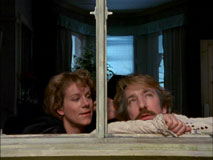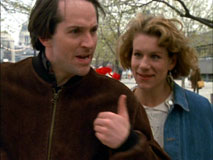|
Newest Reviews:
New Movies -
The Tunnel
V/H/S
The Tall Man
Mama Africa
Detention
Brake
Ted
Tomboy
Brownian Movement
Last Ride
[Rec]³: Genesis
Hara-Kiri: Death of a Samurai
Indie Game: The Movie
Abraham Lincoln: Vampire Hunter
Old Movies -
Touki Bouki: The Journey of the Hyena
Drums Along the Mohawk
The Chase
The Heiress
Show
People
The Strange Affair of Uncle Harry
Pitfall
Driftwood
Miracle Mile
The Great Flamarion
Dark Habits
Archives -
Recap: 2000,
2001, 2002,
2003, 2004
, 2005, 2006,
2007 , 2008
, 2009 ,
2010 , 2011 ,
2012
All reviews alphabetically
All reviews by star rating
All reviews by release year
Masterpieces
Screening Log
Links
FAQ
E-mail me
HOME
| |
Truly Madly Deeply (Anthony Minghella) 1991
 The debut feature of director Anthony Minghella, Truly
Madly Deeply is an odd duck of a movie that never really gets off the
ground. By sandwiching together a fantastic ghost story with a mundane love
story, it ends up diffusing both, resulting in a seemingly random mix of scenes.
It doesn’t help much that the film takes as long to get going as it does. For
nearly half an hour, we have to watch as a multitude of clichéd and overly
quirky characters are introduced before we really touch upon the central
relationship in the film (and every one of their tired storylines needs to be
resolved patly before the film’s end). Poor Nina (Juliet Stevenson) has lost
Jamie (Alan Rickman) her lover, and can’t get over it. Everyone she associates
with sympathizes deeply with her, and whenever she leaves the room they talk
about how wonderful a person she is and how tragic the loss is. The problem is
that for all of the obvious attempts of the screenplay to make us understand the
profound loss that Nina feels, it never succeeds. When his strangely corporeal
ghost shows up, apparently because Nina’s longing was too great to allow him
to move on, she’s moved greatly, but for the audience the effect is almost
nonexistent. Since we never got to know Jamie, we couldn’t possibly have
missed him.
The debut feature of director Anthony Minghella, Truly
Madly Deeply is an odd duck of a movie that never really gets off the
ground. By sandwiching together a fantastic ghost story with a mundane love
story, it ends up diffusing both, resulting in a seemingly random mix of scenes.
It doesn’t help much that the film takes as long to get going as it does. For
nearly half an hour, we have to watch as a multitude of clichéd and overly
quirky characters are introduced before we really touch upon the central
relationship in the film (and every one of their tired storylines needs to be
resolved patly before the film’s end). Poor Nina (Juliet Stevenson) has lost
Jamie (Alan Rickman) her lover, and can’t get over it. Everyone she associates
with sympathizes deeply with her, and whenever she leaves the room they talk
about how wonderful a person she is and how tragic the loss is. The problem is
that for all of the obvious attempts of the screenplay to make us understand the
profound loss that Nina feels, it never succeeds. When his strangely corporeal
ghost shows up, apparently because Nina’s longing was too great to allow him
to move on, she’s moved greatly, but for the audience the effect is almost
nonexistent. Since we never got to know Jamie, we couldn’t possibly have
missed him.
 The film moves awkwardly on from here, as Nina attempts to
keep people from seeing Jamie, who moves into her flat and brings some annoying
ghostly friends. For a while, they seems to recapture the idealized glee that
lives at the start of a good relationship where two people want to shut out the
rest of the world, but before long reality begins to set in (no, they don't stop
to ask if it's necrophilia), and Nina begins to remember that life with Jamie
was not perfect, regardless of how his death made her reconceptualize it. This
seems a relatively sound message for the film, but it bungles it totally when it
attempts to move on from it. Nina begins to strike up a new relationship with an
even more idealized man who utterly idealizes her. Instead of learning from her
relationship with Jamie, she gets caught up with this seemingly perfect
stranger, simply because he has a pulse. When he begins declaring his love
before he even learns Nina’s last name or address, the film expects us to get
weepy and cheer, but ignore everything that it’s taught us to that point.
It’s befuddling. Minghella’s later films were filled with a sort of refined
visual poetry that made them captivating even at their most maudlin moments, but
the only poetry in Truly Madly Deeply is the sappy kind that the two
leads recite for each other. The film seems at first to want to show the
audience a more realistic angle on the romantic film since it has homely people
cast in its roles, but as soon as the sparks start to fly, the director trots
out the same soft focus and mood lighting as any other movie, and the effect
seems discordant with the rest of the film’s tone. When Minghella wants to
show us that Nina is ready to start a new life, he has a subsidiary character
give birth so that Nina can breathlessly declare, “It’s a new life!”
It’s most likely this sort of gross simplification that probably makes many
people respond to Truly Madly Deeply, but it’s precisely that sort of
dunderheaded simplicity that turned
me off.
The film moves awkwardly on from here, as Nina attempts to
keep people from seeing Jamie, who moves into her flat and brings some annoying
ghostly friends. For a while, they seems to recapture the idealized glee that
lives at the start of a good relationship where two people want to shut out the
rest of the world, but before long reality begins to set in (no, they don't stop
to ask if it's necrophilia), and Nina begins to remember that life with Jamie
was not perfect, regardless of how his death made her reconceptualize it. This
seems a relatively sound message for the film, but it bungles it totally when it
attempts to move on from it. Nina begins to strike up a new relationship with an
even more idealized man who utterly idealizes her. Instead of learning from her
relationship with Jamie, she gets caught up with this seemingly perfect
stranger, simply because he has a pulse. When he begins declaring his love
before he even learns Nina’s last name or address, the film expects us to get
weepy and cheer, but ignore everything that it’s taught us to that point.
It’s befuddling. Minghella’s later films were filled with a sort of refined
visual poetry that made them captivating even at their most maudlin moments, but
the only poetry in Truly Madly Deeply is the sappy kind that the two
leads recite for each other. The film seems at first to want to show the
audience a more realistic angle on the romantic film since it has homely people
cast in its roles, but as soon as the sparks start to fly, the director trots
out the same soft focus and mood lighting as any other movie, and the effect
seems discordant with the rest of the film’s tone. When Minghella wants to
show us that Nina is ready to start a new life, he has a subsidiary character
give birth so that Nina can breathlessly declare, “It’s a new life!”
It’s most likely this sort of gross simplification that probably makes many
people respond to Truly Madly Deeply, but it’s precisely that sort of
dunderheaded simplicity that turned
me off.
* *
07-26-02
Jeremy Heilman
|